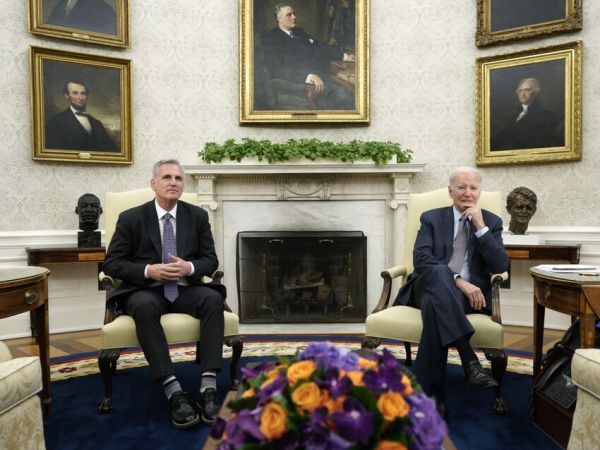US debt ceiling deal must clear Democratic Senate, Republican House before being signed
ALBAWABA – United States (US) President Joe Biden and House of Representatives Speaker Kevin McCarty reached a preliminary deal to suspend the US debt ceiling Saturday evening, ending a months-long standoff.
Nonetheless, even with the congressional approval, the US will be at least four days late on paying its bills, due on June 1, Al Jazeera reported.
The deal entails a bill that would suspend the $31.4 trillion borrowing cap, according to Reuters, and Congress is scheduled to vote on it Wednesday.
Republicans and Democrats have been at each other’s throats for months over the issue, as the deadline for paying the United States’ government bills approaches.

Should this agreement go through, the US debt ceiling will be raised for two years, but spending will be capped for the entire duration, Reuters reported.
However, both sides of the negotiations, Democrats and Republicans, will be required to make considerable concessions on their initial demands to realize such a deal.
Republicans want to cut domestic spending over as many years as possible. Whereas Democrats have offered smaller cuts over fewer years. They also want to include defence spending limits in any agreement moving forward, but Republicans don't.
The United States government reached the debt ceiling in January 2023, and has been running on the Treasury Department’s extraordinary measures for weeks now.
Support from both parties will be needed to win congressional approval next week before the United States runs out of money to pay its debts on June 5.
"I just got off the phone with the president a bit ago. After he wasted time and refused to negotiate for months, we've come to an agreement in principle that is worthy of the American people," McCarthy tweeted.
Biden called the deal "an important step forward" in a statement, saying: "The agreement represents a compromise, which means not everyone gets what they want. That’s the responsibility of governing."
In more details, Reuters explained that the deal would suspend the debt limit through January of 2025, while capping spending in the 2024 and 2025 budgets, claw back unused COVID funds.
It would also speed up the permissions process for some energy projects and it includes some extra work requirements for food aid programs for impoverished Americans.
Biden and McCarthy have to carefully work towards finding a compromise that would clear the House, with a 222-to-213 Republican majority, and Senate, with a 51-to-49 Democratic majority.
Failing to find the sweet spot that would win the approval of both parties can possibly result in a US default over the next two to three weeks.
The last time the US got this close to defaulting on its debts was in 2011.
Washington also had a Democratic president and Senate back then and a Republican-led House.
Congress eventually averted a default, but the economy endured heavy shocks, including the first-ever downgrade of the United States’ credit rating and a major stock sell-off.







